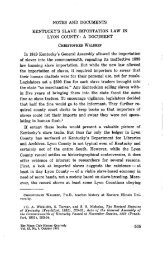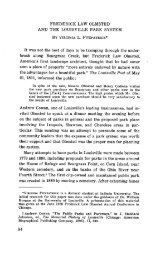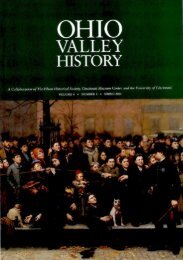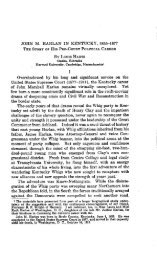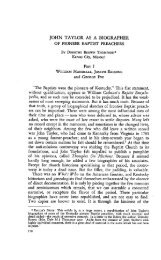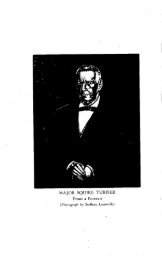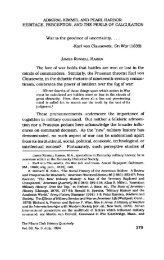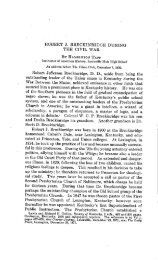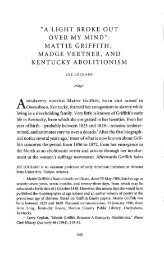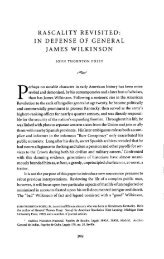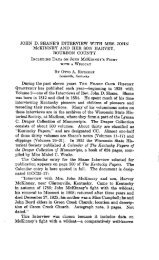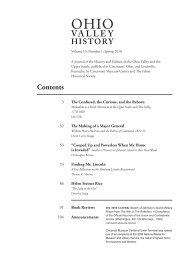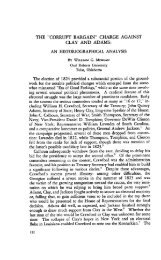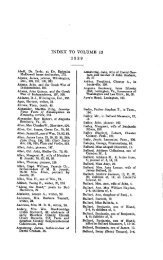THE JACKSON PURCHASE And THE END OF THE NEUTRALITY ...
THE JACKSON PURCHASE And THE END OF THE NEUTRALITY ...
THE JACKSON PURCHASE And THE END OF THE NEUTRALITY ...
Create successful ePaper yourself
Turn your PDF publications into a flip-book with our unique Google optimized e-Paper software.
<strong>THE</strong> <strong>JACKSON</strong> <strong>PURCHASE</strong><strong>And</strong><strong>THE</strong> <strong>END</strong> <strong>OF</strong> <strong>THE</strong> <strong>NEUTRALITY</strong> POLICYIn KENTUCKYBY JACK CA•-BERTBrescia College, Owensboro, KentuckyKentucky's Jackson Purchase region was once part of a great ChickasawIndian land tract enclosed by the present day Tennessee-Mississippistate line, the Tennessee River, the Ohio River, and the MississippiRiver. It was secured to Kentucky in 1819 by her Governor, Isaac Shelby,and by General <strong>And</strong>rew Jackson. In that year the Governor and theGeneral concluded a treaty with the Chickasaw Indians which extinguishedthe latter's rights in the area. The upper part of the tract wasturned over to Kentucky, out of which seven counties were formed,and the great remainder was incorporated into Tennessee. 1Located at the western extremity of the state and hemmed in amongwestern Tennessee, Southeastern Missouri, and that portion of Illinoisknown as "Egypt," the Kentucky part of the Purchase sat astride theintersection of four major river systems--the Tennessee, Cumberland,Ohio, and Mississippi--and, thus, lay in the very midst of the rivertrade between the North and South. Also, it became a great tobaccogrowing section and, hence, a heavy slaveholding area, ranking evenlywith .the Bluegrass section of the state in this respect. 2 The JacksonPurchase, however, remaified substantially an annex to the state ofKentucky. The character and sympathies of its people, to a large extent,were alien from the rest of the state. Drawn to the Democracy of theirregion's namesake, and lying closer to its seat in Nashville, 'than totheir own politici•l capital, Frankfort, whkh had long been held.in theclutches of Whiggery, the people .often hoped in "the years prior, to1861 that they might join with the remainder of the Purchase in Tennesseeto "form a state whose government would be more immediatelyidentified with their own interests. This iong standing desire of thePurchase to secede from the state of Kentucky played a most importantpart in influencing the decision .Kentucky made in 1861 in regard tothe question of the Union.In 1861, Kentucky sentiment for the Confederacy increased in thesouthwestern portion of the state, until in the Purchase area almostthe entire population was in full support of the South.4 Southern Demo-206
1964] Neutrality Policy in Kentucky 207crat John C. Breckinridge had carried the section by a large majorityin the presidential election of 1860,5 and, once disunion threatened,the people made no hesitation in choosing the side of the Confederacy.Impatient with the Frankfort government, which in mid-Spring of 1861was wavering between North and South, the Purchasers in May, 1861,held a convention at Mayfield in which the proposition to secede fromKentucky was earnestly discussed and recommended? While this planof secession did not carry, in a special election for Congressmen heldin June, 1861, nine weeks after Sumter, the tobacco-growing First CongressionalDistrict, that is, the Jackson Purchase, elected the only States'Rights or secessionist Congressional candidate from the entire state.Runr•ing as a Democrat in a district where the Democratic party hadsince 1826 commanded overwhelming majorities, the incumbent, HenryC. Burnett, was re-elected to office by four-sevenths of the total votecast.7Secessionist feeling in the Purchase grew throughout the summer of1861. A "Great Peace Meeting" held on August 26, 1861, at the Murraycourt house, Calloway County, reaffirmed the support of the Purchasefor Kentucky's pro-Southern Senators John C. Breckinridge andLazarus %V. Powell as well as of their own Congressman, Henry Burnett.After denouncing the current war being waged against the secessionists,the meeting announced the determination of the Purchasepeople "never to be shot or bayoneted into a love of the Union in violationof the Constitution." s Such decisiveness of opinion put the wholePurchase on edge and made conditions ripe for trouble. A special reportof John M. Johnson, sent to the Purchase by Governor Beriah Magoffinto examine conditions there, stated that there was a "great uneasiness"felt. throughout the border counties, many people having removedtheir families from the area. This fear of an impending crisis, it wasstated, had resulted in the practice of wearing arms, and it was fearedthat the whole situation would "lead to violence towards those of oppositeopinions." 9- The two main population centers in the Purchase in 1861 were thetowns of Paducah and Columbus. Columbus in 1860 had a populationof some 963 persons. It was located on the Mississippi River eighteenmiles below Cairo, Illinois, forty-seven miles below Paducah on theOhio, and forty-five miles above Island No. 10. It was the northernterminus of the Mobile and Ohio Railroad. The bluff overhangingthe city commanded the Mis'sissippi River for five miles,l° Thus, it canbe seen that Columbus occupied a most advantageous commercial andmilitary position, and, hence, came to be considered by the Confederatemilitary authorities sitting across the state line in Union City, Tennessee,as the northern key to the control of the Mississippi.11
208 The Filson Club History Quarterly [Vol. 38The citizens of Columbus for their part were ready to oblige theConfederates in whatever way they could. They had been in full sympathywith the South from the very beginning of the war. As early asApril 22, 1861, they had invited Jefferson Davis to occupy their townas well as to seize Cairo, Illinois. TM The town's mayor, B. W. Sharpe,was in complicity with Confederate General Gideon J. Pillow in UnionCity. On June 1, 1861, Sharpe informed Pillow by letter that the citizensof Columbus were "preparing to mount heavy guns and to collect militarystores," is obviously in preparation for full-fledged support of theSouthern cause. Thus, on June 24, 1861, General Simon B. Buckner, incharge of a militia group of the Kentucky State Guards, determined tomove. He ordered six companies of troops to Columbus, under GeneralLloyd Tilghman, in order to protect Kentucky's neutrality there. Sostrong was Southern sentiment in that place, however, that very soonafterwards General Tilghman, a native Paducahian, passed over theTennessee line and cast his fortunes with the Confederate cause. 14Paducah was located on the Ohio River fifty miles above Cairo, Illinois,and immediately below the mouth of the Tennessee River. Itpossessed connections with all the Southern railroads. Prior to theopening of the war it had been "the most important place of businesson the lower Ohio." is Throughout the summer of 1861, however, itwould appear that the city even outdid its prewar commercial record.It became a focus for a funnel through which material and supplieswere shot southward by rail and water. With the blockading of theMississippi River at Cairo by the Federal forces, and later with theclosing of the Louisville and Nashville Railroad between Louisville andNashville, Paducah became the main outlet and inlet for all tradesouthward, since all trade switched to the Tennessee and Cumberlandrivers2"Paducah during the summer of 1861 was often referred to as "theCharleston of Kentucky," being located within the Purchase which wasdubbed "the South Carolina of Kentucky." •7 Immediately after thefall of Fort Sumter, Paducah had taken on a definite secessionist •ittitudeand had soon sent most of her young men off to the Confederateservice,as General Lloyd Tilghman, of Paducah, and the city's "greatestsoldier," took many Paducah State Guards with him into the Confederacywhen he resigned his post •t Columbus in June of 18617° In thatsame month Southern sympathies proved so strong in the city that inthe Presbyterian Church "only ten out of a congregation of one hundredand fifty could be found to support the Union." 20 Relations betweenthe townsfolk and their Northern neighbors, who patrolled the OhioRiver in gunboats and made forays up the Tennessee and Cumberlandrivers, became steadily worse as the summer wore on. Events finally
1964] Neutrality Policy in Kentucky 209reached a semi-climax on August 22, 1861, in the widely publicized andrather ridiculous incident wherein a Federal gunboat steamed intoPaducah and cut loose from the docks the IV. B. Terry, a boat whichwas claimed to belong to the Confederates. The crew of the Terry anda "mob" of Paducah citizens then retaliated by seizing the Samuel Orr,a boat belonging to the citizens of Evansville, Indiana. It was made offwith down the Tennessee River. Two persons were wounded in thegunshot fracas that accompanied the seizure. The Federal invaders leftthe city in a state of consternation,21 only to return some two weekslater to occupy it.The Confederate forces in western Tennessee sat idle throughoutmost of the summer of 1861. The duty of watching and opposing theprogress of the Union armies from Cairo, Illinois, southward had beenassigned them. Owing to the neutrality policy in Kentucky, however, allaction on their part was necessarily at a standstill,m In May, 1861, thecommanding Confederate General, Gideon J. Pillow, had drawn PresidentJefferson Davis' attention to the dangers existing for the Confederacyin the Mississippi Valley between Cairo and Memphis. Whileproceeding to fortify Memphis, Pillow at the same time prophesiedto Davis that the Federal forces would make an effort "to effect alodgment at Columbus, fortify that place, and, with a strong invadingcolumn, turn my works, attack them in reverse, crush my supportingforce, capture the guns, and open the river." z• The Federals, he maintained,would meet with success in this plan since the flat area of Tennesseelying to the north of Memphis was unfavorable for any type ofConfederate fortifications. 24Thus, General Pillow soon came to have an obsession for fortifyingthe bluffs at Columbus. By the middle of May, 1861, he had askedGovernor Magoffin of Kentucky for permission to occupy that town,saying that "If he should withhold his consent, my present impressionis that I shall go forward and occupy the work upon the ground of itsnecessity for protecting Tennessee." =5 Pillow was temporarily dissuadedin a move of this type, however, by Kentucky's General Buckner whomet with him in Union City, Tennessee, to impress upon him the seriousnessof the move. It was at this time that Governor Magoffin realizedthat a dangerous situation was developing in western Kentucky.He therefore sent the six companies of troops, above mentioned, toColumbus in an attempt to maintain the state's neutrality,s°Late in the summer of 1861, Leonidas Polk, formerly an EpiscopalBishop, but now a General of the Confederacy, arrived to take commandin western Tennessee. Immediately he began overseeing the constructionof certain defenses being erected along the Mississippi river
210 The Filson Club History Quarterly [VoL 38north of Memphis. These defenses were meant to ward off a threatenedattack of the Federal gunboats. General Polk, however, came to Pillow'sconclusion concerning this country. Both banks of the river along Tennessee,Arkansas, and the southeastern tip of Missouri were extremelylow and flat. They rose so little above the level of the wa•:er that it wasimpossible to find anywhere a position from which guns could commandthe river, except for some low sandy islands which had grown uppiecemeal during past floods. General Pillow had already begun theconstruction of fortifications on one of these, Island No. 10, locatedjust below the Kentucky-Tennessee line. This position, however, wasquite unsatisfactory in that it was subject to inundation. If the riverhappened to be in flood stage, Federal gunboats would be able to sweepdown from Cairo past the fortifications and then could land theirtroops anywhere in northwestern Tennessee. Hence, Polk's eyes, likePillow's, were drawn to the Columbus bluffs which possessed an apparentmilitary valueYGeneral Polk determined to occupy Columbus if the opportunitypresented itself. As has been noted, the people of Columbus wouldnot have been averse to such action, and General Polk knew this. Furthermore,he saw that Kentucky was gradually slipping into Unionism.The June Congressional and the August General Assembly electionsboth were won by Unionist candidates by considerable majorities. Thus,as a first step toward occupation, General Polk sent General Pillowin late August, 1861, with a force to occupy New Madrid, Missouri,located on the Mississippi river opposite Kentucky.2s Then, on September1, 1861, he asked Governor Magoffin exactly what the realintentions of the Southern party in Kentucky were, saying "I think itis of the greatest consequence . . . to the Southern cause in Kentucky• . . that I should be ahead of the enemy in occupying Columbus andPaducah." .00Governor Magoffin, although felt by many to be a secessionist, favoredno Southern invasion of Kentucky. On August 24, 1861, he hadwrit:ten Jefferson Davis concerning the collection of troops along thesouthern border of Kentucky. He asked assurances that the ConfederateGovernment would "continue to respect and observe the position indicatedas assumed by Kentucky." 3o President Davis replied on August28 that the Confederacy neither intended nor desired to disturb theneutrality of Kentucky. The assemblage of troops to which GovernorMagoffin referred had no other object than to repel a lawless invasionof Tennessee by Federal forces "should their Government seek to approachit through Kentucky, without respect for its position of neutrality."31 Such apprehensions, maintained Davis, were not groundlessin view of the recent course of Federal action in Maryland, Missouri,
1964] Neutrality Policy in Kentucky 211and "more recently in Kentucky itself." 3., In connection with this lastpoint, Davis made it clear that the Confederacy would not unconditionallyguarantee a respect for the neutrality of Kentucky. The Confederacy,he stated, would continue to respect the neutrality of Kentuckyonly so long "as her people will maintain it themselves." m Hence,Kentucky could expect the Confederacy to respect her neutral positiononly so long as she forced the Union to respect it. Events occurring tothe north of her in Illinois made this condition a difficult one.The city of Cairo, Illinois, in 1861 was a rat-infested, low-lying,puny river town located at the junction of the Ohio and Mississippirivers. It had been occupied by Federal troops on April 25 of that yearin order to protect it against a threatening Southern invasion. Cairo,located further south than any other Union city, possessed a strongSouthern sentiment stemming out of its dependence on the river tradebetween North and South.-It was actually a Southern city within aNorthern state, but the Illinois state authorities and Federal troopshad stifled effectively all opposition to the Union. The city had beenconverted into a great military post against which the Confederateshad no corresponding foothold on the Mississippi River. It was a centerfor the concentration of men and the equipping of gunboats, expeditionsdown the Mississippi and up the Ohio being fitted out there.34The Federal troops sitting in Cairo throughout the summer of 1861grew restless with the stalemate in the war brought about by the neutralityof Kentucky. The troops were eager to fight and to get at thedisloyal Purchase district of Kentucky. Thus, they occasionally madeforays across into Kentucky. In early June they crossed over and disperseda camp of Kentuckians at Elliott's Mills.35 A little later, theythreatened an invasion of the state in order to observe more closelythe enemy in Tennessee. One spokesman noted that neutrality "wouldgo up" after the August elections for the General Assembly?6Northern public opinion assumed that the beginning of serious hostilitiesin the area was only a matter of time. The Governors of thestates of the Old Northwest met and by memorial and delegation urgedthe Lincoln administration to make the Ohio line of defense secure bymoving forward and occupying advance posts in Kentucky and TennesseeYIn late August, General Polk had aggravated the situationfurther by moving up and occupying New Madrid, Missouri, causingthe Federal authorities to strengthen the Cairo garrison.• The battlelines were being drawn, and while the officials in Washington werekeeping close tab on the situation,3° the Federal commanders in theWest were preparing plans for action.
212 The Filson Club History Quarterly [Vol. 38In late August, 1861, General John C. Fremont, embroiled in thethorny and fluid Missouri situation, decided to get out of one messby opening up another. As Federal commander in Missouri, he wasresponsible for the whole situation developing along the Mississippiand Ohio rivers in the area about Cairo. Spurred on by Northern publicsentiment, and infuriated by the Paducah Terry-Oft incident of August22, he by late August, 1861, was advocating to Brigadier-General LorenzoThomas, Adjutant-General of the United States Army, that Kentuckybe involved in military operations.*° Then, in early September,as the situation below Cairo was rapidly disintegrating, Fremont senta telegram to Lincoln stating thatThe War Vessels of the enemy are all steel plated mounting heavy guns,better armed faster and larger than ours. Their Officers are all of the U.S.Navy, whilst our Officers can not hold .their ground after the first fire;there can be no other result than our capture; there is a very urgent wantin Cairo of heavy canons [sic].... The enemy is beginning to occupy thecoast of Kentucky Hyckman [sic] Paducah ....4aThis situation showed, Fxemont concluded, that the time had come tohave command extended to Kentucky?2 On September 5, 1861, Fremontinformed Lincoln, quite correctly, of the impending Confederateoccupation of Columbus?3Ulysses S. Grant arrived in Cairo on September 4, 1861. He hadbeen a general for less than a month, and the command of the Cairogarrison was his third assignment in that capacity. 44 As early as May,1861, he had become convinced that General Pillow and the Confederateswere planning an attack on Cairo,*" and once put in command ofthat post he lost no time in thinking up a plan of action to put theUnion on the offensive and the Confederacy on the defensive in thearea below Cairo. He saw that it was imperative that the Union securecontrol of the Cumberland and Tennessee rivers at the earliest possiblemoment, since the Cumberland offered a clear highway to Nashville,Tennessee, and the Tennessee offered one all the way to Mississippiand Alabama. 4e Also, he saw that the control of the Mississippi Riverbelow Cairo was vital to any invasion of the South, since control of itwould split the Confederacy in twain, leaving the two parcels with nocommunication between them, and, hence, at the mercy of any Federaltroops invading via the rivers. Thus, when conditions in western Kentuckyreached their climax in early September, 1861, Grant was notat a loss as to what he should do to advance the Union cause.In late August, 1861, General Fremont caused to be set in motion aseries of military movements in Missouri, saying that it was intended,"in connection with all these movements, to occupy Columbus, Ken-
1964] Neutrality Policy in Kentucky 213tucky, as soon as possible." *• In accord with this plan, General Granton September 2 placed a force in occupation of Belmont, Missouri, asmall village on the Mississippi River opposite Columbus, Kentucky.•sMeanwhile, the Federal forces in Illinois opposite Paducah made demonstrationsthreatening that city.4°In executing the order to occupy Belmont, the Federal gunboats sentto that place extended their reconnaissance down the Mississippi to apoint around Hickman, Kentucky. Here, to their surprise, they foundthat the Confederate army had advanced into Kentucky and had setup camp at Hickman. Its tents extended for half a mile upon the shorefronting the river. Secession flags bedecked the place. Later, while returningup the river to Cairo, the Federal gunboats were fired on bythe party in control of the guns at Columbus?° General Polk had finallymade his move and had beaten the North in grabbing a crucial westernKentucky position. ,The populace of Columbus received General Polk and his army inopen arms. They had long been keeping him informed of Federalmovements about Cairo51 and had only recently turned over some oftheir arms to the Confederate encampment at Union City. 5• They nowrecounted to Polk how they had feared for themselves and their propertyunder the threat of Federal invasion, for they had heard of theoutrages committed across the river in Missouri by Northern soldiersagainst defenseless persons. They maintained that the Federals hadbeen threatening their city with two gunboats, had been throwingbombs into their town "in the very midst almost of shrinking, affrightedwomen," had crossed the river and dispersed a company of citizens drillingnear Columbus, and had disembarked from a gunboat and torndown a Confederate flag.Aside from these outrages, they explained to Polk how they werebeing forced to pay, under the neutrality policy of Kentucky, a Federaltax for the purpose of carrying on the war against the South. Moreover,they pointed out that the commercial life of the city had beenruined by the Federal blockade of the river. The populace, thus, wishedGeneral Polk "a cordial welcome." • General Polk then issued a proclamationin which he justified his occupation of the town, saying thatit was necessary in the face of obvious Federal military preparations inMissouri designed to seize the place. He took pleasing note of the welcomegiven the Confederate troops, assuring the people that their propertyand rights would be protected.•General Grant heard of Polk's move from a scout of General Fremonton the day after he had assumed command in Cairo. as He determinedto seize Paducah at once, for he took the statements Fremont
214 The Filson Club History Quarterly [Vol. 38had been making in the last few weeks in regard to Kentucky at theirface value, that is, that it was intended to seize Columbus "as soon aspossible." •G Since Columbus had now gone over to Polk, there wasno time to lose in grabbing Paducah before it too was taken. The Federalinvasion madainery was set in motion. Grant telegraphed Fremontof his intentions, saying that he was taking steps to be in advance ofthe enemy in securing PaducahY Boats were steamed up in Cairo forthe transportation of troops to Paducah. As Fremont sent no word toprevent the departure, the whole expedition left around midnight ofthe night of September 5, 1861, arriving before Paducah around daylightof the next day. •When General Grant entered the city, he found it bedecked in secessionistflags in expectation of a force sent by Polk from Columbus.This force was said to be only 16 miles off and 3,800 strongP9 Indeed,it had marched as far as Mayfield, to which point General Tilghmanand his staff had fled; they had been present in the city as Grant approachedit. •° Grant's 1,600 troops took quiet possession of the railroaddepot, where Grant found large quantities of rations, leather, foodstuffs,ammunitions, and clothing marked for shipment southward tothe Confederate army. Also occupied was the telegraph office, an actof little value since the departing Confederates had cut all wires leadinginto the town. All shipments of goods between Cairo and Paducahwere ordered stopped, c• Thus, General Grant effectively closed in oneswoop the Tennessee River and the Paducah railway as a Southernimportation route.Polk in occupying Columbus had committed the first overt act inthe Purchase. Justifying his action to the Frankfurt government was,thus, his immediate task. On September 9, 1861, he informed GovernorMagoffin that a military necessity had compelled him to occupy Columbus.He could not have sat back and allowed the Federal forces to havetaken a position so important to the defense of western Tennessee.That they intended to do this, he maintained, was clear from theiroccupation of Belmont two days previous to his occupation of Columbus.He pointed out that it was in keeping with the wishes of the Columbuscitizenry that he was in their city. He stated, however, that hewas prepared to withdraw from the town provided that the Federaltroops leave Paducah and the Purchase simultaneously, with a guarantee,which he would give reciprocally for the Confederate government,that they should not enter or occupy any part of Kentucky in thefuture.°2
1964] Neutrality Policy in Kentucky 215Polk next dashed off a justification for his action to the state legislature,taking entirely the wrong bent by pointing out to the legislatorsKentucky's violations of her own neutrality policy. The state had,Polk contended, allowed the Paducah seizure of the W. B. Terry, whichbelonged to Confederate citizens. She had allowed the cutting of timberfrom her forests for the building of Union gunboats. She had allowedthe establishment of Union army recruiting stations within her borders.Her representatives in Congress had voted supplies of men and moneyto carry on a war against the Confederacy. Thus, what Polk did injustifying his action at Columbus was to expose the fallacy of the doctrineof neutrality, for it was impossible for a state to be neutral andremain within the Union. In presenting the issue so clearly, he was toplay directly into the hands of the Union party within the state."aThe Confederate war offices in Richmond were in turmoil throughoutthe day of September 4, 1861. On hearing of Pillow's move to Hickman,Secretary of War L. P. Walker instructed Polk to order his"prompt withdrawal from Kentucky." 04 Walker also asked for anexplanation of the movement.• Polk appealed his case to PresidentDavis, saying that Federal soldiers had seated themselves '*with cannonand entrenched lines opposite the town of Columbus... making suchdemonstrations as left no doubt upon the minds of any of their intentionto seize and forcibly possess" the town. •6 Therefore, Polk continued,he had resolved to give the protection requested by the Columbuscitizenry as well as *'to prevent in time the occupation by the enemyof a point so necessary to the security of Western Tennessee." c7 It washis intention, concluded Polk, *'to continue to occupy and. keep thisposition." •8 Davis telegraphed back that **The necessity justifies theaction," •0 later explaining to the Confederate Congress that the step"was justified not only by the necessities of self-defense on the partof the Confederate States, but also by a desire to aid the people ofKentucky." 7oGovernor Isham G. Harris of Tennessee was another principal figureinvolved in the debate among Richmond, Frankfort, and Polk over the.Columbus occupation. Harris informed Polk on September 4, 1861,that he considered the whole thing *'unfortunate as the President andmyself are pledged to respect the neutrality of Kentucky." The TennesseeGovernor asked that the troops '*be withdrawn instantly, unlesstheir presence there is an absolute necessity." 71 To Frankfort he sentthree commissioners to explain to Governor Magoffin his position andto express the hope that the Confederates would withdraw. TM He alsoinformed the Kentucky General Assembly that "The Confederate troopsthat landed at Hickman last night did so without my knowledge orconsent; and I am confident, also without the consent of the President
216 The Filson Club History Quarterly [Vol. 38[Davis]." 73 President Davis, however, as has been noted, was in theprocess of siding with Polk. The appeal for withdrawal which Harrisshortly made to Secretary of War Walker and to Davis, thus, had noeffect. Davis finally replied and justified the occupation by saying thateverything "must give way" to the security of Tennessee and other partsof the Confederacy.74 Polk, when protested to by Harris, gave largelythe same reasons for the occupation that he had given Davis and theKentucky officials. TMAs the September, 1861, crisis gripped the state, spreading fromwest to east, it tore the neutrality policy to shreds. In Louisville, thefirst two weeks of September saw a vicious running debate between thecity's two leading newspapers, the Morning Courier, the secessionistpaper, and the Daily ]ournal, the Unionist one. The Courier proclaimedthe whole mess in the Purchase to be the result of a plot conceived bycertain Federal army officers and the Unionist members of the GeneralAssembly. It was planned, the Courier maintained, that the Federalswould seize both Paducah and Columbus, while the General Assemblywould sanction the move, overriding Governor Magoffin's veto. Desperateas this move was, the Federals had decided on it owing to thegreat amount of war cargo leaving Paducah for the South. The schemewas finally wrecked in the very nick of time by Polk's occupation ofColumbus. As proof of its charge the Courier republished an articleappearing in the September 5, 1861, issue of the Chicago Times, "anAdministration war paper," in which this plan was revealed to theNorthern public by that newspaper's Cairo correspondent. TMThe Journal, reflecting a growing tide of opinion in Kentucky, calledfor the immediate expulsion of the Confederates from the state. Itmaintained that "In the history of the world, no page records a moreunprovoked assault upon a people.., than the invasion of Kentuckyby the Right Reverend Generalissimo Polk and that martinet, GideonJ. Pillow." 7r If the Confederates refused to withdraw then they wouldbe given "as red a war as mortal eyes ever beheld." 78 Such a war wouldnot cause the secession of Kentucky, as the disunionists hoped for, butwould produce a Union patriotism in Kentucky which would "not bebroken up in the face of this threat." r0The Magoffin administration, filled with Southern sympathizers,was firmly committed to the policy of neutrality, since by September,1861, it was apparent that the state could not be swung into secession.Hence, Governor Magoffin was greatly distressed over the threat presentedto neutrality by the Purchase invasions. General S. B. Buckner
1964] Neutrality Policy in Kentucky 217of the State Guards favored a Confederate withdrawal, and so informedthe Confederate authorities. He promised that if they would order awithdrawal he could "rally thousands of neutrality Union men to expelthe Federals." soMeanwhile, in the legislature, a nasty situation was developing forthe administration, which was accused by some of being in complicitywith Polk, Pillow, and Davis in the occupation of Columbus. GeneralBuckner, it was said, had been in Richmond during the first days ofSeptember proposing to the Confederate authorities certain Kentuckymilitary movements "in advance of the action of her Governor." sl OnSeptember 3 the Richmond government was said to have promised himcountenance and assistance in the scheme. Before Buckner returned toKentucky, Polk had invaded the state,mThe General Assembly had convened September 2 and had at thattime reaffirmed the neutrality policy pursued since the previous May.s3When the news of the Columbus occupation reached Frankfort, a specialcommittee of the legislature was formed which notified Polk thatthe people of Kentucky were "profoundly astonished that such an actshould have been committed by the Confederates, and especially thatthey should have been the first to do so with an equipped and regularlyorganized army." s4 They asked that he withdraw immediately,sa Polk'sanswer justified his position by reciting to the legislators a long list ofKentucky's violations of her own neutrality policy, s6 Polk stated that"We are here, therefore, not by choice but by necessity" and set forthhis promise to withdraw if the Federals would,s7 The Senate in themeanwhile had sent two of its members to the Purchase to investigatethe situation first-hand,ssEvents moved quickly. A few hours after the news of General Polk'smove reached Frankfort, it became known that Confederate GeneralFelix K. Zollicoffer had invaded southeastern Kentucky near CumberlandGap. s° The legislature promptly ordered that the flag of theUnited States be hoisted on the capitol. The Union attitude of theGeneral Assembly was, thus, clearly brought out as the Confederacyencroached upon the state's borders. The Southern cause was lost inKentucky.On September 11, 1861, the Kentucky House of Representatives refusedby a vote of 29 to 68 to pass a resolution demanding the removalfrom the state of both the Federal and Confederate troops.°° It thenproceeded, after much private deliberation, by a vote of 7l to 26 in theHouse, and 25 to 8 in the Senate, to resolve "That Governor Magoffinbe instructed to inform those concerned that Kentucky expects the Confederateor Tennessee troops to be withdrawn from her soil unconditionally."91 Governor Magoffin immediately vetoed the resolution, but
218 The Filson Club History Quarterly [Vol. 38the legislators just as quickly passed it over his veto. °-" The GeneralAssembly then waited a week for the Confederates to leave, and whensuch leave was not forthcoming proceeded to take measures to compelthem to do so?3 On September 18, 1861, a series of resolutions passedthe legislature which effectivel), declared the state for the North. Provisionswere made for the expulsion of the Confederates. A volunteerexpulsion force was to be raised by United States Army General Robert<strong>And</strong>erson of Fort Sumter fame and a native Kentuckian. All Kentuckianswere called on to co-operate in this undertaking, includingGovernor Magoffin, who was instructed to put the state militia underthe command of General Thomas L. Crittenden.• Governor Magoffinvetoed the resolutions on the grounds that the envisaged military set-uptook away his rights as commander-in-chief.°5 The General Assemblyoverrode the veto by a vote of 69 to 21 in the House and 24 to 10 inthe Senate?• Magoffin then had no choice but to issue a proclamationin accordance with the General Assembly mandateY Federal troopswould shortly swarm into the state, which had been opened to themby the General Assembly. Kentucky had declared herself an active supporterof the Federal government and had, in fact, declared war on theSouthern Confederacy. Neutrality had died with Columbus.The neutrality policy pursued by Kentucky from May to September,1861, in regard to the American civil conflict then raging, was somethingcurious to her own historical and geographical position.9s It was,in fact, in view of her past, the natural course that she should follow--the middle role of compromiser between North and South. It provedto be, in view of her close Southern ties, a substitute for secession. Shecould never have actually seceded, for her geographic position left herexposed too greatly to an invasion by thousands of Northern troops.Yet Kentucky was never at heart for secession: while she vigorouslyopposed the Lincoln administration, she could not see wrecking theprecious Union simply because a group contrary to her interests hadtemporarily come into control of the government. Thus, neutralityalso served as a cloak for Unionism.The Federal government had wisely understood the neutrality ofKentucky. Lincoln had told General Buckner early in the war that aslong as there were roads around Kentucky to reach the rebellion, "itwas his purpose to leave her unmolested.... ,, o9 Thus, Kentucky waslulled into a sense of security behind her neutrality, and Lincoln gainedthe time he so badly needed. I°° The Union forces restrained themselvesfrom any overt act in Kentucky; in the meantime they educated thepeople in Unionism under the cloak of neutrality.By September, 1861, Kentucky had broken her own neutrality. The
1964] Neutrality Policy in Kentucky 219June, 1861, Congressional elections indicated that the people did notwant secession. The August, 1861, elections for the General Assemblyturned the legislative branch of the state government over to the Unionists.These newly-elected legislators considered themselves to be definitelyinstructed, by the vote which had given them control of theGeneral Assembly, to declare for the Union once the state's neutralityhad been violated by Polk. 1°1 Hence, Polk's occupation of Columbuswas "almost as deplorable for the southern cause in Kentucky as thefiring at Sumter was for that cause in the northern states." lo2 Thedecision of the Frankfort legislature to declare for the North was, thus,precipitated by events in the Purchase. Here native Southern sentiment,Northern intrigues, and Confederate military commanders ended theKentucky neutrality policy.BIBLIOGRAPHYI. Government PublicationsPapers, Acts, and Resolutions of the Kentucky Legislature, Relating to the Existing IF*at,Session of 1861. Frankfort: Jno. B. Major, 1861.The War of the Rebellion: A Compilation of the Official Records o/ the Union andConfederate Armies. 70 vols. in 128. Washington: Government Printing Office, 1880-1901.Louisville Daily ]ournalLouisville Morning CourierIILII.NewspapersBiographies, Memoirs, and Writings of Public MenBasler, Roy P., ed. The Collected lV'orks o/ Abraham Lincoln. 8 vols. New Brunswick,N. J.: Rutgers University Press, 1953.Cromer, Jesse G., ed. Letters of Ulysses S. Grant to his Father and his Youngest Sister1857-78. New York and London: G. P. Putnam's Sons and The Knickerbocker Press,1912.Davis, Jefferson. The Rise and Fall of the Confederate Government. New York: CollierBooks (paperback abridgment), 1961.Garland, Hamlin. Ulysses S. Grant. New York: Doubleday and McClure Company, 1898.Grant, Ulysses S. Personal Memoirs of U. S. Grant. 2 vols. New York: Charles L.Webster & Company, 1885.iV.Civil War HistoriesCampbell, Robert A. The Rebellion Register: A History of the Civil War in America.Indianapolis: A. D. Streight, I867.Greeley, Horace. The American Con[lict: A History of the Great Rebellion . . '. to theClose of the War ]or the Union. 2 vols. Hartford: n. p., 1869.Kenell, Thomas P.. History o] the Great Rebellion . . . from Official Sources. 2 vols.Cincinnati: Charles Tuttle, 1863.Lossing, Benson J. The Pictorial Field Book of the Civil War in the United States o/America. 3 vols. Hartford: T. Belknap, 1874.Nicolay, John G. The Outbreak o/ Rebellion. New York: CharIes Scribner's Sons, 1882.Smith, Edward Conrad. The Borderland in the Civil War. New York: The MacmillanCompany, 1927.
220 The Filson Club Histor7 Quarterly [Vol. 38V. Grant and Lincoln: Special WorksCarton, Bruce. Grant Moves South. Boston and Toronto: Little, Brown & Company, c1960.Nicolay, John G. and John Hay. Abraham Lincoln. 10 vols. New York: The CenturyCompany, 1890.Sandlsurg, Carl. Storm Over the Land. New York: Harcourt, Brace & ComIxn•y, c1939.Williams, Kenneth P. Lincoln Finds a General. 5 vols. New York: The Macmillan Company,1949-1959.VI. Kentucky HistoriesBattle, J. H., W. H. Perrin, and G. C. Kniffin. Kentucky. A Hi•tory of the State . . .and its Subsequent Development. Louisville and Chicago: F. A. Battery Publishing Company,1885.Kinkead, Elizabeth Shelby. A Hi•tory o] Kentucky. New York, Cincinnati, and Chicago:American Book Company, c1896.McElroy, Robert McNutt. Kentucky in the Nation's History. New York: Moffat, Yard &Company, 1909.Shaler, Nathaniel S. Kentucky. A Pioneer Commonwealth. Boston and New York:Houghton, Mifflin & Company and The Riverside Press, Cambridge, 1885.Smith, Zachariah Frederich. The History of Kentucky. Louisville: The Prentice Press,1895.VII. Kentucky: Special WorksCoulter, E. Merton. The Civil War and Readjustment in Kentucky. Chapel Hill andLondon: The University of North Carolina Press and Humphrey Milford, OxfordUniversity Press, 1926.Neuman, Fred. G. Stary o[ Paducah. Paducah: Young Printing Company, 1920.VIII. Articles and Essays in Periodicals,Annuals, and Publications of Learned SocietiesFish, Carl Russell. "The Decision of the Ohio Valley." Annual Report of AmericanHistorical Association [or the Year 1910, pp. 153-164.$crugham, Mary. "The Peaceable Americans of 1860-1861." Studies in Hissory, Economics,and Public Law, XCVI, No. 3 (1921).IX. MiscellaneousThe American Annual Cyclopaedia and Register of Important Events ]or the Year 1861.New York: D. Appleton & Company, 1862.Chandler, Julian A. C. and others, eds. The South in the Building of the Nation. 12vols. Richmond, Virginia: The Southern Historical Publication Society, c19o9.FOOTNOTES1 j. H. Battle, W. H. Perrin, and G. C. Kniffin, Kentucky. A History of the State . . .and Its Subsequent Development (Louisville and Chicago, 1885), part If, pp. 3-6.2 Carl Russell Fish, "The Decision of the Ohio Valley," Annual Report of the AmericanHistorical Association /or the Year 1910, p. 157.a Battle, Pectin, and Kniffin, Kentucky, part II, p. 7.4 Ibid., part I, p. 353.5 Fish, "Ohio Valley," p. 162.6 Battle, Perrin, and Kniffin, Kentucky, part If, p. 7.Horace Greeley, The American Con[lict: A History o[ the Great Rebellion . . . tothe Close o• the l•ar for the Union (Hartford, 1869), I, p. 609; Zachariah FrederichSmith, The History o[ Kentucky (Louisville, 1895), p. 602.8Louisville Morning Courier, September 7, 1861, p. 1.9Ibid., September 6, 1861, p. 2.10 Battle, Perrin, and Kniffin, Kentucky, part II, p. 71; The American Annual Cyclopaediaand Register of Important Events of the Year 1861 (New York, 1862), p. 103.
1964] Neutrality Policy in Kentucky 221a* Thomas P. Kettell. History o/the Great Rebellion . . . /tom O/tieial So*fret •Cincinnatl,1863), I, pp. 310-311.mA. J. Barry and others to Davis. April 22. 1861, The War o] the Rebtllion: ACompilation o] the Ot]icial Rttords of the Union and Con]ederate Armies (Washington,1880-1901), l, 52, part 2,pp. 61-62.tg Benson J. Lotting, The Pictorial Field Boo• of the Civil Igat in the United Stateso• America (Hartford, 1874), IS, 72n.14 Smith, Kentucky, p. 603.Is A#n#al Cydopatdiaj p. 561.lSlbid., pp. 561-562.t* Battle, Perrin, and Kniffin, Kentucky, part II. p. 7.tSlbid., part II, pp. 81-82; Fred G. Neuman, Story o] Paducah (Paducah, Kentucky,1920), p. 37.t*Neuman, Paducah, pp. 38, 41; Elizabeth Shelby Kinkead, A History o] Kentucky(New York, Cincinnati, and Chicago, c1896), p. 177.e°A. B. McEIroy to R. J. Breckinridge, June 12, 1861, in E. Met,off Coulter,The Civil W/ar and Readiuament in Kentucky (Chapel Hill and London, 1926), p. 106m¢1 Courier, September 6, 1861, p. 2; August 22, 1861, Reports on the Capture of theSteamer W. B. Terry and Samuel Orr, at Paducah, Ky., O. R., I, pp. 4, 176-178.m John G. Nicolay and John Hay, Abraham Lincoln (New York, 1890), IV, p. 203.•* John G. Nicolay, The Outbreak o/ Rebellion (New York, 1882), pp. 133-134.•* Ibid.¢5 Ibid.¢* The Frankfort government also for a time considered fortifying Paducah against theFederals in Cairo, but the plan failed. Coulter, Civil It/at, p. 107.m Edward Conrad Smith, The Borderland in the Civil W/aF (New York, 1927), p. 295.es Ibid.z9 Polk to Magoffin, Sept. 1, 1861, O. R., I, pp. 4, 179.so Jefferson Davis, The Rise and Fall of the Confederate Government (New York,1961), p. 194.st Ibid., pp. 194.195.m Ibid•m Ibid.Smith, Bordoland• p. 138; Annual Cyclopaedia, p. 91. :s5 June 8, 1861. Rebellion Record, I, pp. 94, 95 in Coulter, Civil l•'ar, p. 107.•C. Wicldiffe.to Folk, August 6, 1861, O.R., I, pp. 4, 381 in Coulter, Civil gVar,p. 107.87Hay and Nicolay, Lincoln, IV, p. 401.Annual Cyclopaedia, p. 91.ao Kenneth P. Williams, Lincoln Find: A General (NewYork, 1952), Ill, p. 54.40 Fremont to Thomas, August 25, 1861, O. R., I, pp. 4, 1?7.4* Roy P. Basler, ed., Tke Collected lFqrks of Abraham Lincoln (New Brunswick,N.J., 1953), IV, p. 510. :4*Lincoln sent the communicat!on to General Winfield Scott. Seott's reply has notbeen located. Ibid.•Frernont to Lincoln, September 5, 1861, O. R., I. pp. 3, 141.•Bruce Cattun, Grant Moves South (Boston and Toronto, c1960), p. 46.•Jesse G. Cramer, ed., Letters of Ulysses S. Grant to his Father and his Youngest$iaer 18J7-78 (New York and London, 1912), p. •.Catton, Grant, p. 48.47Fzemont to Grant, August 28, 1861, O. R., ], pp. 3, 141-142.is Courier, September 6, 1861, p. 4; Coulter, Civil IFar, p. 108.i°Julian A. C. Chandler and others, The South in the Bsdlding of the Nation (Richmond,Virginia, c1909), I, p. 291.5°Courio, September 5, 1861, p. 1; Rodgers to Fremont; September 4, 1861, O. R.,I, pp. 3, 152.•t Chat. E. Taylor to Polk, August 7, 1861, O. R., I, pp. 4, 383.t*Louitville Daily Journal, September 6, 1861, p. 2.5*George C. Taylor and others to Polk, September 5, 1861, O. R., I, pp. 4, 181-184.,4 Papers, Arts, and Reaolutions of the Kentucky Legislature, relating to the ExistingV/ar, Session of 1861 (Frankfort, 1861), pp. 4-5."Ulysses S. Grant, Personal Memoirr of U. S. Grant (New York, 1885), I. pp.264.265.
222 Tha Filson Club History•Quarterly [Vol. 38Wdhams, Lincoln, tIl, pp. 53-54. " ..... .m Grant, l•lemoirs, I, p. 265.ss Ibid. • .•gNeum•n, Padueah,.pp. 39-40;-Greeley, America• Conflict, 1, pp. 612-613; AnnualCyclopaedia, p. 400.OOKettell,-Great Rebellion, I. p. 311; Grant to Fremont, September 6, 1861, O. R.,1, pp. 4, 197.,t Courier, September 11, 1861, p. 4, September 12, 1861, p. 4; Robert A. Campbell,The Rebellion Register: A History of the Civil IVar in America (Indianapolis, 1867),p. I91.6: Existing War, p. 4. • -e• Smith, Borderland, p. 298.•Walker to Polk, September 4, 1861, O. R., l, pp. 4, 180-181.0• Ibid.•e Polk to Davis, September 4, 1861, O. R., I, pp. 4, 181.6• Ibid.6s Ibid.• Davis to Polk, September 4, 1861, O. R., I, pp. 4, 181.70 Richardson, Messages and Papers o/the Con/ederacy, I, p. 137. Message to Congress,November 18, 1861, in Coulter, Civil War, p. 109. Davis and Polk never gave up injustifying the invasi9n. The question was discussed throughout the month of Septemberin their correspondence. Polk said at one point that as soon as the Confederacy hadwon a few battles in the area, Kentucky would abandon her position of neutrality andwould secede. Davis himself held that the Confederacy could not permit "the indeterminatequantities, the political elements" 1'o control its action in cases of militarynecessity, even though he told Governor Harris of Tennessee that he was willing towithdraw the troops if it could be safely done since this would be in accord with his"declared policy of respect for the neutrality of Kentucky." Davis to Harris, September13, 1861, Polk to Davis, September 14, 1861, Davis to Polk, September 15, 1861, O. R.,I, pp. 4, 188, 190-1.91.7x Harris to Polk, September 4, 1861, O. R., I, pp. 4, 180.¢ZHarris to Davis, Septembez 13, 1861, O. R., I, pp. 4, 189-190.:s Greeley, American Conflict, I, 612; Annual Cyclopaedia, p. 399.74 Davis to Harris, September 13, 1861; 0. R., I, pp. 4, 190. . :.• Polk 1o Harris,' Seplember 4, 1861, O. R., I, pp. 4, 180.•SSeptember 10, 1861, pp. 1, 2; September 14, 1861, p. 2. As a way out of' thewhole mess, and knowing now that the state could not be swung for the South, theCourier maintained that the General Assembly should demand that the forces of bethparties be withdrawn from the Purchase. September 10, 1861, p. 2.•TSeptember 10, 1861, p. 2.7SSeptember 7, 1861, p. 2.•September 7, 1861, p. 2. General Polk's suggestion that beth Federal and Confederatetroops withdraw simultaneously, with a guaranlee by each that neither wouldoccupy the state in the future, was denounced as a highhanded move on Polk's l•art notworthy of consideration. September 13, 1861, p. 2.s° Buckner to S. Cooper, September 13, 1861, O. R., I; pp. 4, 189-190.s* Nicolay and Hay, Lincoln, V' p" 43.• e* Ibid.sa ]ourn,d, September 7, 1861, p. 2.&*John M. Johnston to Polk, September 9, 1861, O. R., l, pp. 4, 185."SSlbid., p. 186.seSe¢ p. 215 above.•Polk to John M. Johnston, September 9, 1861, O. R., I, pp. 4, 187.SSCourier, September 9, 1861,'p. 1.StNathaniel S. Shaler, Kentucky. A Pioneer Commonwealth (Boston and New York,1885), p. 250.Ibid., p. 252.9tlbid., p. 251; Existing IVar, pp. 6-7.o2 Shaler, Kentucky, p. 251; Kinkead, Kentucky, p. 175.sa That the Confederate military authorities were actually the ones who made thedecision to remain in Kentucky is indicated in the foIIowing note of General AlbertSidney Johnston, who on September 10, 1861, assumed command over Polk. Said Johnston:"The legislature of Kentucky has required the prompt removal of all ConfederateP,rces from her soil, and the governor of Kentucky has issued his proclamation to that
1964] Neutrality Policy in Kentucky 223effect. The troops will not be withdrawn. It is not possible to withdraw them now fromColumbus in the west, and from Cumberland Ford in the east without opening thefrontiers of Tennessee and the Mississippi River to the enemy, and this is regarded asessential to-our present line of defense as well as to any future operations." Johnston toDavis, September 16, 1861, O. R., I, pp. 4, 193.04 Existing War, pp. 7-9.°SCoulter, Civil Wart p. 115.Existing War, p. 9.07 Annual Cyclopaedia, p. 400.9s Coulter, Civil War, chapters 1-6, repeatedly makes many of the points which Isummarize here.o9 Robert McNutt McElroy, Kentucky in the Nation's History (New York, 1909), p.536.•°°Coulter, Civil War, p. 100.lol McEIroy, Kentucky, pp. 541-542. This is not to say that a large minority of Kentackiansin 1861 did not wish to join the Confederacy. The simple fact is, however, thatin September, 1861, the majority had decided for the Union.l°ZMary Scrugham, "The Peaceable Americans of 1860-1861,'" Studies in History,Economics, and Public Law, XCVI, No. 3, p. 121.



